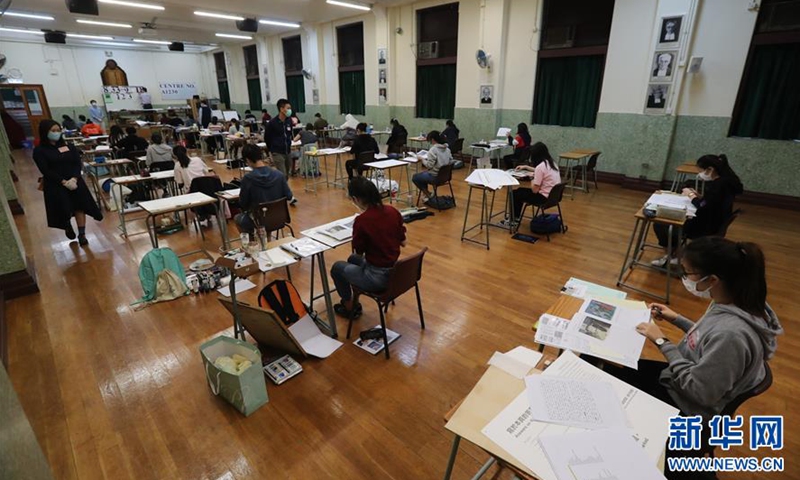
Hong Kong File Photo: Xinhua
As some secessionists openly supported a petition in protest of the recent textbook amendments in Hong Kong on Friday by calling the corrections “political censorship”, their behavior is no more than political hype, a Hong Kong education expert told the Global Times on Monday, as more voices emerge in calling for deepening reforms in youth education.
The petition is backed by a pro-secessionist educational organization – the Hong Kong Professional Teachers' Union.
The newly formed student group “Education Breakthrough” along with the Progressive Teachers’ Alliance and Hong Kong Educators Alliance, also joined in the petition, which aims to collect at least 10,000 signatures calling on the bureau to withdraw the revisions, South China Morning Post reported on Friday.
Hong Kong's education bureau confirmed on August 18 that it has sent advice to a number of publishers that had voluntarily submitted their liberal studies textbooks to the education regulator for consultancy.
The revisions include stressing that protestors will be held legally accountable if they violate the law, strengthening students' identity as both Hongkongers and Chinese, and clarifying that Hong Kong's political system is not based on "separation of the three powers."
A total of six publishers and eight textbooks have gone through the consultancy, which was conducted by a team of education professionals appointed by the education bureau.
One of the key figures in supporting the petition is the former vice president of the radical separatist group Demosisto, Isaac Cheng Ka Long. He helped Joshua Wong Chi-fung plot a strike-vote plan for June 14 to defy the national security law for Hong Kong.
Cheng has been identified as a key anti-government figure in the statements of the Hong Kong and Macao Affairs Office of the State Council in mid-June.
He continued to commit crimes by instigating Hong Kong youth and using them as "ammunition and tools" against the national security law for Hong Kong, as stated by the office.
On May 26, Cheng was arrested by Hong Kong customs for violating the trade description laws and illegally selling facemasks with the tag “Not made in China” distributed by Demosisto, iFeng News reported. He was later released on bail.
Tang Fei, a principal at Hong Kong’s Heung To Secondary School (Tseung Kwan O), told the Global Times on Monday that the new wave of protests is just another series of obfuscating tactics to accumulate political capital.
“This is a standard procedure for these secessionists – setting up a ‘student union’, claiming to have experienced political persecution, and inciting the public,” Tang said. “They are politically hyping an educational issue.”
Standing behind Cheng, the Hong Kong Professional Teachers’ Union was formed on the basis of pro-secessionism as early as 1973, and has been supporting secessionist activities ever since.
One teacher from this union, Alvin Tai, who was infamous for inciting hatred toward the Hong Kong government and police, viciously posted that “all children of police officers will die before they reach 7 years old” on Facebook in July 2017, while the Hong Kong Professional Teachers’ Union only “punished” this member by saying his claims were “questionable.”
On Wednesday, the union accused the revisions of being “a type of political censorship” and “distorting the real situation of the society.”
Hong Kong's education bureau has pointed out that it is the teachers’ union that has "politicized the cause of education", and criticized the organization for "spreading falsehood and deliberately smearing."
Tang stressed that the revisions are completely legitimate, saying “We always have textbook examinations here in Hong Kong. The education bureau did not examine the textbooks for Liberal Arts because there were no official textbooks for this subject, which was taken advantage of by secessionist politicians, and now we are making it right.”
The recent textbook revisions are in line with an initiative passed by the Hong Kong Legislative Council's (LegCo) panel on education in January, suggesting the establishment of a textbook review subcommittee aimed at the city’s system to prevent future violence.
The mob violence and social chaos that has ensued since last year has shed light on a painful reality – education in Hong Kong has gone wrong, as HK Legislative Council member Regina Ip Lau Suk-yee noted in an interview in mid-July.
Textbook revisions and the beginning of education reform mark the beginning of a long way for education in Hong Kong to be put on the right track.
According to Ip, in addition to learning knowledge, the education of social values is very important. Schools and the SAR government should apply more focus on patriotic education, so that students can respect the country and understand real situations and developments.
In July, Carrie Lam, Chief Executive of the HKSAR, has asked the Hong Kong Education Bureau to make plans to carry out all-round education on the Constitution, the Basic Law, the National Anthem Ordinance and the national security law for Hong Kong in schools.
She also believes that education reform would effectively enhance students' national awareness and interest in national development in a comprehensive, in-depth and interesting way.




